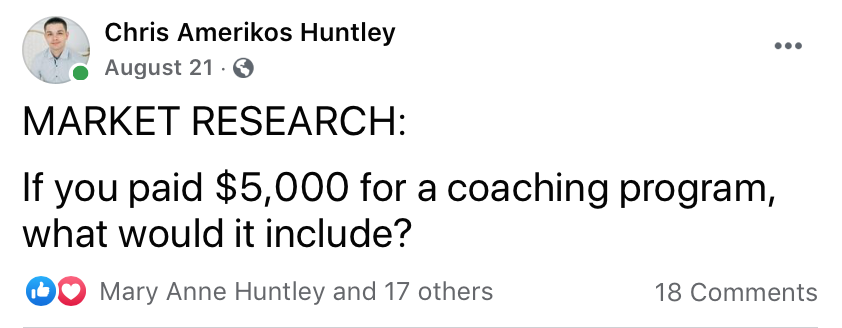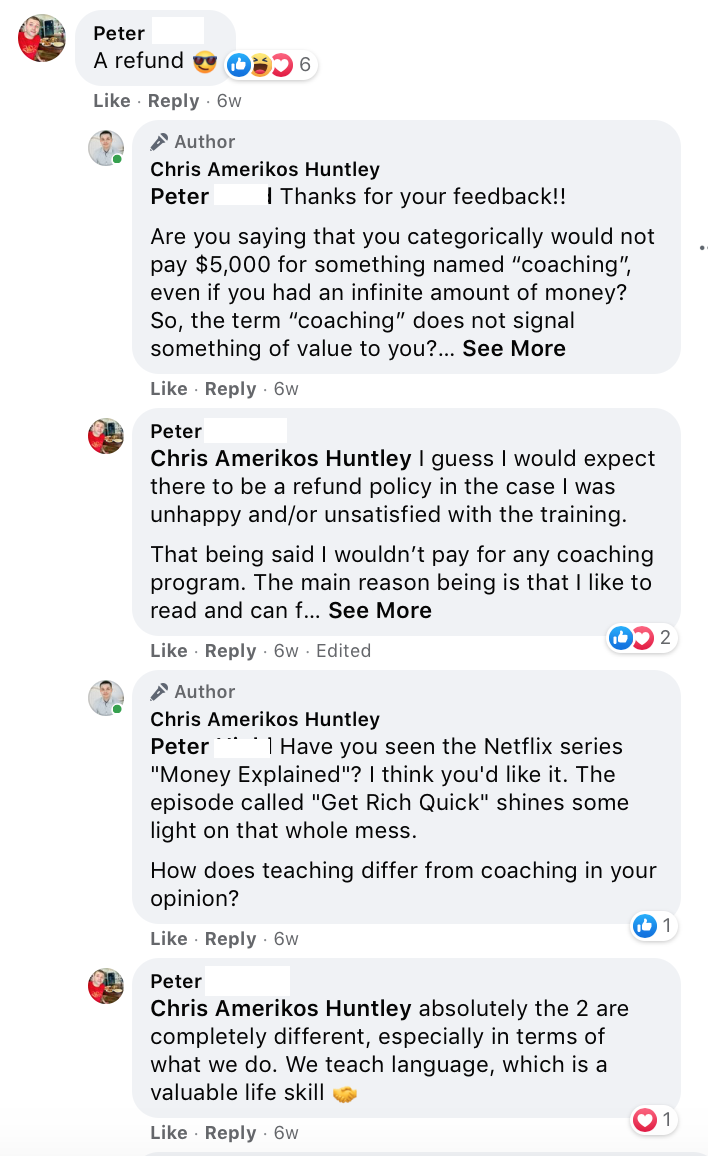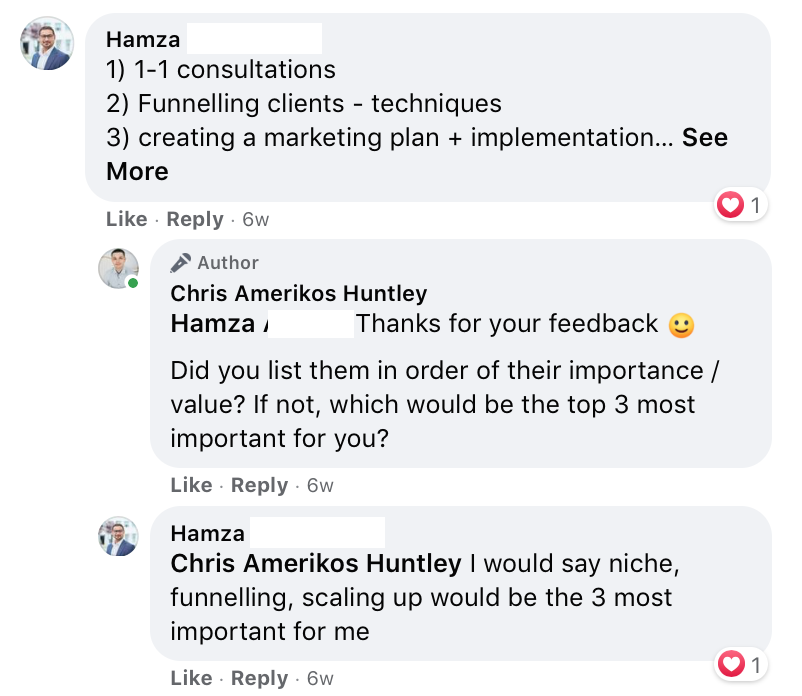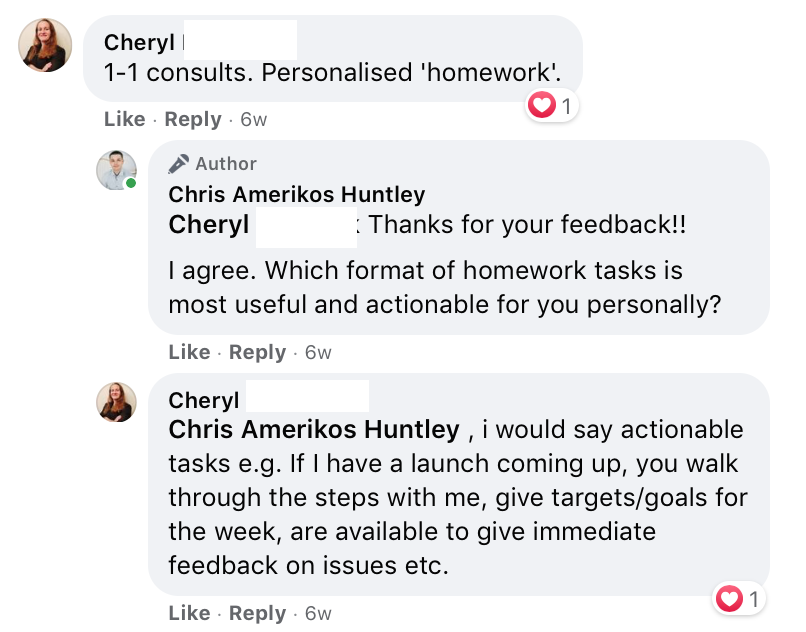Market Research for Your Teaching Business Product - Real-Life Example from My Own Business

Hey everybody, Kris Amerikos here. And in this video I'm going to show you some market research that I did on Facebook for my teaching business product. You can do the same for any teaching services, coaching services, consulting services, etc.
Usually when you do market research, you don't write "market research" when you're posting somewhere or asking people questions. But I decided to do that openly because the audience that I'm working with needs to know what market research is, and they need to have some vague idea of what that means in order for them to be interested in products that I have.
Step By Step Description of Market Research for Coaching Products
So the answers I got are the signal that I have the right audience. The people who are responding, I believe have already been targeted a little.
So my question here was: "If you paid $5,000 for a coaching program, what would it include?" And I got a few great responses.

Market Research Insight #1 - Mentality and Mindset
So Peter wrote "A refund" and that was a really good one. So I just clarified with him if he was talking about a refund in terms of having a refund policy. For example, guaranteeing a refund if someone isn't satisfied or according to some other terms. Or if he's just saying that there's no value in things called coaching in general. Maybe he just would never ever pay for coaching. In my research, I asked him about that and he wrote back that he just doesn't see any value in coaching. So I asked him what he sees as the difference between teaching and coaching. And he says that teaching is a valuable life skill.

In the previous answer he had talked about how coaching is like a toxic environment and that there are people taking advantage of other people, selling overpriced products, things that won't actually help them. So we got a really good picture of the mentality of a person in this position in the market.

Market Research Insight #2 - How to Shape the Offer
Now the next person replied with a list of features that he would want to see. This is awesome, right?
Hamza wrote seven features. And then I wrote back and asked him, which were the top three of those features. And he told me. This really helps me shape my offering. It helps me shape my product. It helps me develop what I already have, and it just really helps me work with my audience better. I can see how valuable these things are. So that's really, really useful feedback.

Market Research Insight #3 - Personalized Delivery vs. Automized Delivery.
And then the last response that I got was also a list of features, but it was a short list. It was just two focused things. Basically they are asking for more personalization. And this is a really great piece of feedback because it tells us that this person sees higher value in personalized delivery than in automized delivery.

So it's about the process more than the results we can say. And to some degree they want the process to be easy because they want to have access to someone who can make it a lot easier for them and faster for them. And that should lead to a result.
But the automized delivery way would mean that they have all of the responsibility all the time. They learn what they need to learn because they can get it however they need it, or whenever they need it. They can also refer back to it. So a lot of programs today try to balance that. They try to balance some kind of personalized time aspect with automated delivery of a product. And it's difficult to balance those two things when you're developing your product.
Because if you don't know exactly what you're doing, you're not sure of your value. If that's not the case, then sometimes it's going to be really hard to move away from personalized delivery. You might get stuck that way and you won't be able to work with enough clients because you're not charging enough money per client.
So this might be a person who's in a completely different category of their own, right? Because the first person who responded here basically told us that they don't think this thing is valuable. Boom. We know that if we're talking to this type of person, that we should not use the word coaching. They're just against that. Absolutely. And for some good reasons, too.
The second person gave us a list of features. It was a big list and the bigger the list of features that someone tries to list out, you know, they might not actually know what they're talking about because they haven't really gone deep into any of those topics. If they go deep into any major topic of marketing or things like this, there's probably going to be some special training that they would ask more about.
Different Levels of Potential Customers in Your Market Research
So, this was really a great response that shows us different levels of potential customers:
1) Someone who is getting started,
2) Someone who already knows some of the first steps to take and some of the first questions to ask.
3) Someone who already has something developed. Because the last response was more about personalization and it was more about some availability that the person can get. They already know that there's some kind of function that they just need somebody to help with and they could really use advice on.
So, we can see that this market research has been rather successful in the last two hours since I've posted it. We'll see how it goes and you can always come and check my page and see it in real time.
But I hope that this video and blog post helps someone understand what market research is and maybe some appropriate questions that you should be asking your audience when you're doing your market research.
To your success,
Kris Amerikos.

